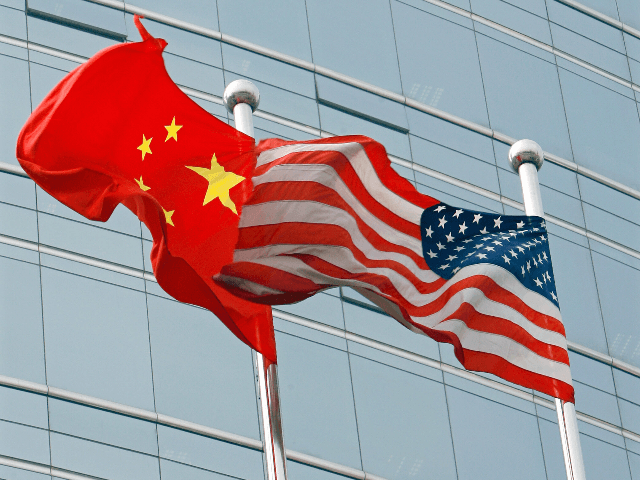Chinese state media spent the weekend celebrating the announcement of a massive trade deal with 14 other Asia-Pacific nations — including key U.S. allies like Japan, South Korea, and Australia, but not the United States itself — as the “end of U.S. hegemony in the West Pacific.”
China’s state-run Global Times said on Saturday that the Regional Comprehensive Economic Partnership (RCEP) “indicates that the majority of Asian countries endorse an Asia-wide regional free trade framework that works to benefit all Asian economies and see it as a landmark step toward achieving closer economic integration in East and Southeast Asia.”
“The RCEP sends out the message that Asian countries do not want to choose sides between the U.S. and China,” the Global Times asserted. “More significantly, they are not willing to blindly follow the US and exclude China, the biggest and most vibrant Asian economy, from the region’s integration process. A sound and healthy economic community in Asia cannot be achieved without China’s participation.”
The Chinese paper said RCEP was envisioned as a response from the Association of Southeast Asian Nations (ASEAN) to the Trans-Pacific Partnership (TPP), a free trade deal ostensibly “dominated by the U.S.” that unfairly excluded China. The U.S. ended up withdrawing from the TPP, a ghost of which lingers as the Comprehensive and Progressive Agreement for Trans-Pacific Partnership (CPTPP), whose major North American member is Canada.
“The Trump administration’s withdrawal from the TPP in 2016 resulted in America’s detachment from the process of Asia’s economic integration. The move, representing a Donald Trump-style economic nationalism and isolationism, was quickly followed by the Indo-Pacific strategy, a pro-active geopolitical initiative aimed at establishing a ‘united front’ in the form of an alliance or quasi-alliance to contain China’s rise,” the Global Times lectured disapprovingly.
The Global Times predicted the prospective Biden administration would either freak out over RCEP or beg to join it on bended knee:
It is, however, highly likely that the Biden administration will change the Trump course and be more engaging in dealing with Asia on the economic front. In this sense, the successful conclusion of the RCEP might raise the alarm to a new and different US government. One should not take it as a surprise if the new Joe Biden presidency uses the RCEP to hype “China threat” in order to build consensus in the US to join the TPP again.
Asia, in the spirit of open regionalism, welcomes more countries to join its regional integration project. If the US wishes to restart its TPP accession, the barriers it will face will not be in Asia, and may not even come from China.
Even if Biden himself strongly hopes to resume the TPP membership, it might still take a long time for the US to reopen the process. The sentiment of economic nationalism in American society runs noticeably deep, and many Democrats, the political base of Biden, certainly are not the best friends of free trade. Candidate Hillary Clinton, when campaigning against Trump in 2016, vociferously objected to the TPP. It will be a painful process for Biden to develop a new narrative.
China’s Xinhua news network hailed the “milestone” RCEP as a much-needed dose of stability at a “critical moment full of uncertainties.”
“The world sees rising protectionism and unilateralism, while trade and economic bullying from certain countries is posing a grave threat to international cooperation as well as the global drive to build an open world economy,” Xinhua sneered.
“The decisiveness of the RCEP countries offers a ray of hope amid an agonizing winter for the global economy. With joint efforts, they have largely put the pandemic under control and have been on the way to recovery through an orderly resumption of work and production,” Xinhua wrote, promising that China is eager to use its resurgent economic strength to help the rest of the world recover from the “stagnated global economy” of the Wuhan coronavirus pandemic.
Another Xinhua article on Monday said RCEP “represents a victory for multilateralism over unilateralism and free trade over protectionism” that will cover almost a third of the global economy.
“The RCEP agreement was signed against the backdrop of the ongoing COVID-19 [Chinese coronavirus] pandemic, which has plunged the world economy into a serious recession with contracted global trade and investment. The signing shows that in the face of challenges, countries should choose solidarity and cooperation over conflict and confrontation, and look out for each other in the spirit of partnership rather than follow a beggar-thy-neighbor approach or sit by and do nothing,” Xinhua wrote.
Xinhua pledged that China, as the largest RCEP economy, would “help build the region’s resilience through an inclusive and sustainable post-pandemic economic recovery process and contribute to the recovery and growth of the world economy.”
“Although the road ahead promises to be bumpy, the RCEP has further unified the region in the pursuit of common economic growth. China will work with all parties to ensure the pact comes into effect soon,” the article concluded.

COMMENTS
Please let us know if you're having issues with commenting.